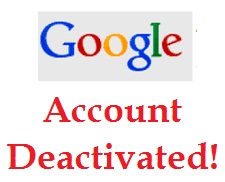Red Flag Warning!
 A red flag warning was issued by the internet last week.
A red flag warning was issued by the internet last week.
That red flag said you CANNOT rely on Google, Facebook, Apple, Dropbox or similar tech companies to store your data or files and always make it available to you.
If you want to always have your pictures, writings, songs, ebooks, email, and other data, information, files, or content available, you need to backup your data and consider getting involved with a project like IndieWeb, the Decentralized Web, or the Personal Digital Home.
Google Deactivates Artist’s Account
Last week I saw the Fusion.net article “Google deletes artist’s blog and a decade of his work along with it.” The article told how an artist and writer can no longer access  most of his personal data and files from more than a decade of his life because Google deactivated his account. This article reaffirmed my commitment to developing the Personal Digital Home. According to the Fusion.net article:
most of his personal data and files from more than a decade of his life because Google deactivated his account. This article reaffirmed my commitment to developing the Personal Digital Home. According to the Fusion.net article:
“Artist Dennis Cooper has a big problem on his hands: Most of his artwork from the past 14 years just disappeared. It’s gone because it was kept entirely on his blog, which the experimental author and artist has maintained on the Google-owned platform Blogger since 2002…”
A friend of mine saw a related Guardian.com article, “Dennis Cooper fears censorship as Google erases blog without warning,” and sent me a link to it. He is interested in working on the Personal Digital Home and knew I’d want to read about Cooper’s problems. The Guardian.com article gave a few more details regarding Cooper’s data “loss.”
“Two weeks ago, writer and artist Dennis Cooper was checking his Gmail when something peculiar happened: the page was refreshed and he was notified that his account had been deactivated – along with the blog that he’d maintained for 14 years…Cooper updated DC’s blog six times a week, highlighting film, fiction and music he enjoyed…
The ramifications of the deactivation are severe. His newest gif novel, Zac’s Freight Elevator, which he’d been working on for seven months, was exclusively hosted on the blog and is now lost. His deleted email account also contained more than a decade’s worth of contacts, as well as offers to talk and perform…”
Free Speech Not In Terms Of Service
The Guardian.com article makes the point that Cooper’s account deactivation by Google may be related to censorship. It also points out that although the US Constitution (as ammended) guarantees free speech, that applies to public censorship, not censorship by a private corporation such as Google, Facebook or Apple. Those companies are free to define the terms of use for their services, and you have to decide how those terms of service may  affect you.
affect you.
“…First amendment rights to free speech in the United States are constrained when one is operating in the world of corporations such as Google or Facebook. “In America you have first amendment rights but that only protects you against public censorship,” said Pati Hertling, an art lawyer and independent curator. “Because it’s Google, they’re a private corporation, it’s a private realm, they can do whatever they want.”
Google’s terms of services state they can “suspend or stop providing our services to you if you do not comply with our terms or policies or if we are investigating suspected misconduct”…”
Smokey The BackupBear: Only You Can Prevent Data Loss
 Fusion.net’s article points out this isn’t just Cooper’s problem. It’s not just the problem of the miniscule 0.0001% of Google’s users who have had their accounts deactivated. And it’s not just Google. Facebook and other tech companies work the same way. It is simply unwise and foolish to blindly expect Google or other companies on the web to store your data and rely 100% on them to make your data available to you for the next 100 years — or even for later today or tomorrow.
Fusion.net’s article points out this isn’t just Cooper’s problem. It’s not just the problem of the miniscule 0.0001% of Google’s users who have had their accounts deactivated. And it’s not just Google. Facebook and other tech companies work the same way. It is simply unwise and foolish to blindly expect Google or other companies on the web to store your data and rely 100% on them to make your data available to you for the next 100 years — or even for later today or tomorrow.
“…this doesn’t just reflect the archival woes of an experimental writer. It’s another reminder of Google’s role as arguably the world’s most powerful organization when it comes to preserving and storing information.
Google says that its “mission is to organize the world’s information and make it universally accessible and useful.” But whether or not it’s interested in maintaining a record of the past, or helping others do so, remains unclear…most of the archival projects Google touted in the early 2000s, such as Google News Archive and Google Groups, were quietly abandoned several years ago…
So the removal of Cooper’s blog doesn’t necessarily feel like a surprise so much as it does part of a quiet trend. As Baio puts it, “We can’t expect for-profit corporations to care about the past.” It’s a trend that suggests a conclusion that’s at once obvious and sad: if the internet is your archive, your archive isn’t safe.”
Even some people who work at Google are upset that Cooper’s Google account was deactivated, that Cooper can no longer access the writing, artwork, emails and other content he created, and that neither Cooper nor anyone else can view the artist’s blog. Guardian.com’s article says:
“…Three followers who work at Google launched simultaneous internal investigations into the blog’s closure. One senior Google staffer worked with Cooper to resolve the issue until 2am one night to no avail….”
 If you want your data to always be safe and available, you need a reliable data backup system.
If you want your data to always be safe and available, you need a reliable data backup system.
Most people don’t know how to set up and maintain a reliable data backup system. Also, people are lazy and they procrastinate, so even if they know how to set up and use a reliable backup, they might not do everything they should to keep their data safe.
Technology changes. Frequently. So the reliable-when-designed backup system will inevitably, at some point, no longer be reliable.
A reliable backup plan for data must include periodically copying your files to new data storage media. Your computer files have a limited shelf life on data storage media, like floppy disks (remember those?), CDs (remember those?), USB flash drives and hard drives. You can’t copy files onto storage media and expect it access it 50 years from now. Your grandchildren certainly won’t be able to access it 75 or 100 years from now. The data may be corrupted on the storage media. Or you might not even have the computer hardware, like a 5.25” floppy drive, to try and access the file.
Cooper was like just about every other computer user and internet services user. It is certain that the number of consumers who have a reliable system for backing up all their data and files is less than 10%. The number is probably less than 1%. Cooper knew he should have his data and files backed up. He just didn’t do it…
Back Up Today (And Tomorrow…)
In closing, the Guardian.com article quoted Cooper.
“…His advice to other artists who work predominantly online is to maintain your own domain and back everything up. “As long as you back everything up. I don’t see really the danger,” he said. “But if you’re at the mercy of Google or some place like Google, obviously I’m a living example of not to be blind like that and think that everything is hunky dory.””
Cooper lost his digital life.
If you don’t want to lose your digital life, do the work required to set up, properly maintain, and update a reliable backup system.
Somewhere between 90% and 99.999% of the people who read about Cooper losing his digital life will not change and do the work required to make sure they won’t lose their digital life.
IndieWeb, Decentralized Web, Personal Digital Home
If you want to help improve the web so people can own their data and not be in danger of losing their digital lives, start working on a project like IndieWeb, the Decentralized Web, or the Personal Digital Home.
——————
 For starters on your data backup work, if you use Google services, like Gmail or Blogger, go to Googe Takeout RIGHT NOW and create an archive of your Google data, then download it to your personal storage media (probably an external hard drive?) as soon as you get the download links from Google.
For starters on your data backup work, if you use Google services, like Gmail or Blogger, go to Googe Takeout RIGHT NOW and create an archive of your Google data, then download it to your personal storage media (probably an external hard drive?) as soon as you get the download links from Google.
If you’re interested in discussing the issues in this post, including the Personal Digital Home, contact Bob Waldron at bwaldron (at) gmail [dott] com.
*****